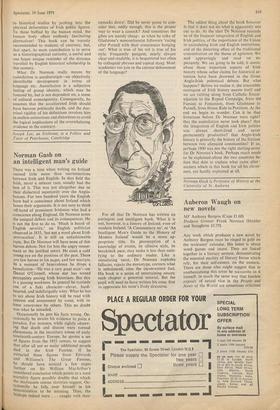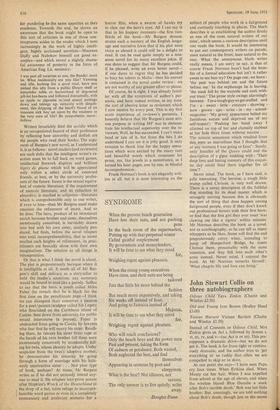Auberon Waugh on new novels
MF Anthony Burgess (Cape £1.60)
Any week which produces a new novel by Anthony Burgess must be ringed in gold on the reviewers' calendar. His latest is about word games and incest. They are linked together in a literary sermon, demonstrating the essential sterility of literary forms which rely, for their self-esteem, on the esoteric. There are those who might suggest that in anathematising this error he succumbs to it himself, in much the same way that fearless exposes of sexual vice in the People and News of the World are sometimes criticised for pandering to the same appetites as they condemn. Towards the end, he shows an awareness that the book might be open to this sort of criticism in one of those con- temptuous asides to the reader which I note increasingly in the work of highly intelli- gent, highly acclaimed novelists—Maureen Duffy and Nabokov himself are good ex- amples—and which reveal a slightly shame- ful awareness of posterity in the form of American Eng. Lit. seminars: I was past all surprises as you, the Reader, must be. What incidentally arc you like? Yawning and idle, looking for a good read, have you picked this idly from a public library shelf or remainder table or barrowload of dog-eared job-lot has-beens and followed distractedly, with an apple or cigarette or/and casual puttings down and takings up, certainly with detach- ment, this dripping of the heart's blood of an innocent sick boy set upon by the madness in the very core of life? Be sympathetic: more: believe.
Writers invariably feed the accidie which is an occupational hazard of their profession by reflecting how unworthy and doltish are the people who read ,their books. The argu- ment of Burgess's new novel, as I understand it, is as follows : novel readers (and reviewers) are such dolts that the intelligent writer's re- action must be to fall back on word games, intellectual firework displays and brilliant legers de plume which will be appreciated only within a select circle of esteemed friends, at best, or by the university profes- sors of the future. Incest is the sexual equiva- lent of esoteric literature; if the requirement of esoteric literature, and its reduction to absurdity, is reached in solipsism—literature which is comprehensible only to one writer, if even to him—then Mr Burgess must make onanism the refinement of incest. And so he does. The hero, product of an incestuous match between brother and sister, themselves incestuously conceived, is inevitably drawn into bed with his own sister, similarly pro- duced, but finds, before the novel relapses into total incomprehensibility, that as incest reaches such heights of refinement, its prac- titioners are basically alone with their own imaginations. The solution to all things is miscegenation.
Or that is what I think the novel is about. The plot is preposterously baroque where it is intelligible at all. It needs all of Mr Bur- gess's skill and delicacy as a story-teller to hold the reader's attention; any summary would be bound to read like a parody. Suffice to say that the hero, a youth called Miles Faber (he reveals that he is black for the first time on the penultimate page—I think we can disregard that) conceives a passion for a poet/painter/sculptor called Sib Legeru who flourished on the Caribbean island of Castita. Sent down from university for public sexual intercourse (a protest), Faber is obstructed from going to Castita by lawyers who fear that he will marry his sister. Reach- ing there, he rescues his sister from rape at the hands of his twin brother (all three were incestuously conceived) by accidentally kill- ing his twin, whose identity he adopts. Under suspicion from the twin's adoptive mother, he demonstrates his sincerity by going through a form of marriage with his hide- ously unattractive sister . . . Not your type of book, perhaps? At times, Mr Burgess writes as if he did not seriously intend any- one to read it. He relapses into prose poems after Hopkins's Wreck of the Deutschland at the drop of a hat, takes refuge in incompre- hensible word games or even in a completely unnecessary and irrelevant scenario for a
horror film, when a swarm of hawks try to claw out the hero's eyes. All I can say is that in his happier moments—the first two- thirds of the book—Mr Burgess demon- strates such a mastery of the English langu- age and narrative form that if his plot were twice as absurd it could still be a delight to read. It can be read quite simply as a non- sense novel for its many excellent jokes. If one dares to suggest that Mr Burgess could, if he pleased, write an even better novel— if one dares to regret that he has decided to bury his talents in Malta—then his answer is contained in the novel under review : we are not worthy of any greater effort to please.
Of course, he is right. I was already famil- iar with all the symptoms of author's par- anoia, and have indeed written, in my time, the sort of abusive letter to reviewers which I now receive by every post. This is my first acute experience of reviewer's paranoia. I honestly believe that Mr Burgess's most seri- ous purpose in writing MF was to demons- trate his- intellectual superiority over the re- viewers. Well, he has succeeded. I can't make head or tale of it, but from the bits I do understand I can see it is jolly good. It only remains to thank him for the happy sensa- tions which were excited by the many rare and beautiful words which ornament his prose, yes, like jewels in a monstrance, as I turned his later pages, one by one, in blissful incomprehension.
Frank Norman's book is not elegantly writ- ten at all, but it is most interesting on the subject of people who work in a fairground and curiously touching in places. The blurb describes it as establishing the author firmly as one of the most natural writers of our time', which seems a curious description until one reads the book. It would be interesting to put our contemporary writers on parade, most natural to the front, least natural to the rear. What the anonymous blurb writer really means, I am sorry to say, is that of course Frank Norman hasn't had the bene- fits of a formal education but isn't it rather sweet to see him try? On page one, we learn : 'the past was behind me and the future before me.' In the orphanage he is leaving, 'the weak fell by the wayside and sank with- out trace.' The prose style swings alarmingly between I'm-a-tough-guy-so-get-stuffed and I'm - a - sweet - little - creature - showing how - grown - ups - write - in - my - school- magazine : 'My grimy appearance belied my fastidious nature and deprived me of my self-respect; 'Pushing her hand away I climbed on top of her and clumsily stabbed at her hole three times without success . . . The ecstatic sensations which resulted from this were so marvellous that I thought that at any moment I was going to faint': Surely, only Jennifer of the Queen could end the description of a gipsy wedding with : 'Their deep love and lasting memory of this exquis- ite day could bind them together for all time'?
Never mind. The book, as I have said, k jolly interesting. The heroine, a tough little tramp called Chrissie, is very well drawn. There is a corny description of the faithful dog standing by its dead master which is strangely moving because this is obviously the sort of thing that does happen among fairground people, even if they don't knock out professional boxers with their first biow, or find that the first girl they ever meet 'was clawing me like a tigress' within minutes. Mr Norman describes the book as a novel, not as autobiography, so he can tell as many whoppers as he likes. Some will find the end preposterously corny when, intending to jump off Hungerford Bridge, he meets
Chrissie. there, presumably with the same intention, and they fall into each other's
arms instead. Never mind, I enjoyed the book. As Mr Norman remarks himself : 'What chagrin life and love can bring.'



































 Previous page
Previous page